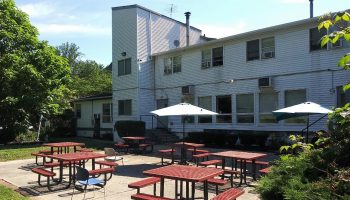Unity Chemical Dependency
About Unity Chemical Dependency
Unity Chemical Dependency offers alcohol and drug rehab services and is part of the Rochester Regional Health network in Rochester, New York. The center provides ambulatory detox, medication-assisted treatment (MAT), inpatient (IP), outpatient (OP), and aftercare programs for young adults and adults.
At Unity Chemical Dependency, clients have a structured environment to begin their recovery and ease withdrawal symptoms. Ambulatory detox focuses on alcohol use disorder; clients undergo hourly sessions for 7-10 days. Clients receive FDA-approved prescriptions, such as naltrexone and Vivitrol, to reduce cravings. Clients also participate in group and individual counseling to strengthen their sobriety.
After detox, clients may transition into inpatient or outpatient programs, depending on their level of acuity. Inpatient programs can last up to 28 days and require constant supervision, education workshops, and group therapy. Outpatient programs can include family resources, community reintegration approaches, and life skills development. Clients may be referred to outside facilities for specialized substance abuse programs.
Unity Chemical Dependency offers self-pay and financing options. Rochester Regional Health is in-network with Aetna, CDPHP, Cigna, Corvel, ElderONE, Emblem Health, Excellus BlueCross/BlueShield, Fidelis, Independent Health, MagnaCare, MultiPlan, TRICARE, United Healthcare, and Wellcare. Medicare and Medicaid are accepted. Please check your insurance provider for coverage and out-of-network benefits.
| Levels of Care | Detox Service Setting | Programs | Payment Options | Medications Offered |
|---|---|---|---|---|
|
Inpatient and residential programs provide round-the-clock medical and emotional support as you live at the treatment facility. This level of care may be recommended if you have severe addictions or mental health conditions since it removes outside distractions and allows you to focus solely on therapy. |
In outpatient therapy, you’ll attend therapy sessions several times each week while living at home. This is ideal if you have a strong support system and a lower risk of relapse. Outpatient treatment offers flexibility to maintain work, school or family obligations. |
Partial hospitalization programs provide comprehensive treatment in a structured setting during the day but allow you to return home at night. These programs offer a balance of inpatient and outpatient rehab and provide intensive support without full time residency. |
||
|
Outpatient detox gives you access to medically supervised withdrawal services while still allowing you to live at home. You’ll attend a clinic for treatment and monitoring. This flexible option is suitable for those with mild to moderate withdrawal symptoms who have strong support systems. |
Medication assisted treatment combines medication and counseling to manage withdrawal and reduce cravings for opioid and alcohol addiction. Medications may include methadone, buprenorphine or naltrexone. MAT is tailored to your needs so you can actively participate in your treatment journey. |
|||
|
Young adult programs are designed for individuals who are transitioning into adulthood. Topics of discussion typically include identity, independence and peer relationships. Providers may also offer life skills training and career support. |
Teen (13 - 18)
|
Women's programs offer a safe and supportive space to focus on gender specific issues such as trauma, family roles and mental health conditions. Therapists tailor the sessions to address women's needs and foster empowerment in a healing and nurturing environment. |
Men's programs address substance use while also considering the social pressures, family roles and mental health concerns that are specific to men. You’ll learn healthy coping mechanisms as you build emotional resilience and develop communication skills. |
Senior programs address the unique needs of older adults like chronic pain, grief and isolation. Programs include peer support and medical oversight for age related health concerns. The goal is to improve quality of life and promote sober aging. |
|
Self Pay
|
Medicaid
|
Private Insurance
|
||
|
Buprenorphine
|
Levels of Care
Inpatient and residential programs provide round-the-clock medical and emotional support as you live at the treatment facility. This level of care may be recommended if you have severe addictions or mental health conditions since it removes outside distractions and allows you to focus solely on therapy.
In outpatient therapy, you’ll attend therapy sessions several times each week while living at home. This is ideal if you have a strong support system and a lower risk of relapse. Outpatient treatment offers flexibility to maintain work, school or family obligations.
Partial hospitalization programs provide comprehensive treatment in a structured setting during the day but allow you to return home at night. These programs offer a balance of inpatient and outpatient rehab and provide intensive support without full time residency.
Detox Service Setting
Outpatient detox gives you access to medically supervised withdrawal services while still allowing you to live at home. You’ll attend a clinic for treatment and monitoring. This flexible option is suitable for those with mild to moderate withdrawal symptoms who have strong support systems.
Medication assisted treatment combines medication and counseling to manage withdrawal and reduce cravings for opioid and alcohol addiction. Medications may include methadone, buprenorphine or naltrexone. MAT is tailored to your needs so you can actively participate in your treatment journey.
Programs
Young adult programs are designed for individuals who are transitioning into adulthood. Topics of discussion typically include identity, independence and peer relationships. Providers may also offer life skills training and career support.
Women's programs offer a safe and supportive space to focus on gender specific issues such as trauma, family roles and mental health conditions. Therapists tailor the sessions to address women's needs and foster empowerment in a healing and nurturing environment.
Men's programs address substance use while also considering the social pressures, family roles and mental health concerns that are specific to men. You’ll learn healthy coping mechanisms as you build emotional resilience and develop communication skills.
Senior programs address the unique needs of older adults like chronic pain, grief and isolation. Programs include peer support and medical oversight for age related health concerns. The goal is to improve quality of life and promote sober aging.
Medications Offered
Amenities
Contact
- Monday 7:30AM - 8PM
- Tuesday 7:30AM - 8PM
- Wednesday 7:30AM - 8PM
- Thursday 7:30AM - 8PM
- Friday 7:30AM - 5PM
- Saturday 8AM - 2PM
- Sunday Closed

Nikki Wisher is an Atlanta-based content writer with over a decade of experience specializing in health and wellness. While she spends most of her days writing about various aspects of health, from addiction recovery to fitness to skin care, she also writes content in many other areas like photography, beauty, and marketing. Her passion project is her inclusive running blog, forallrunners.com.




